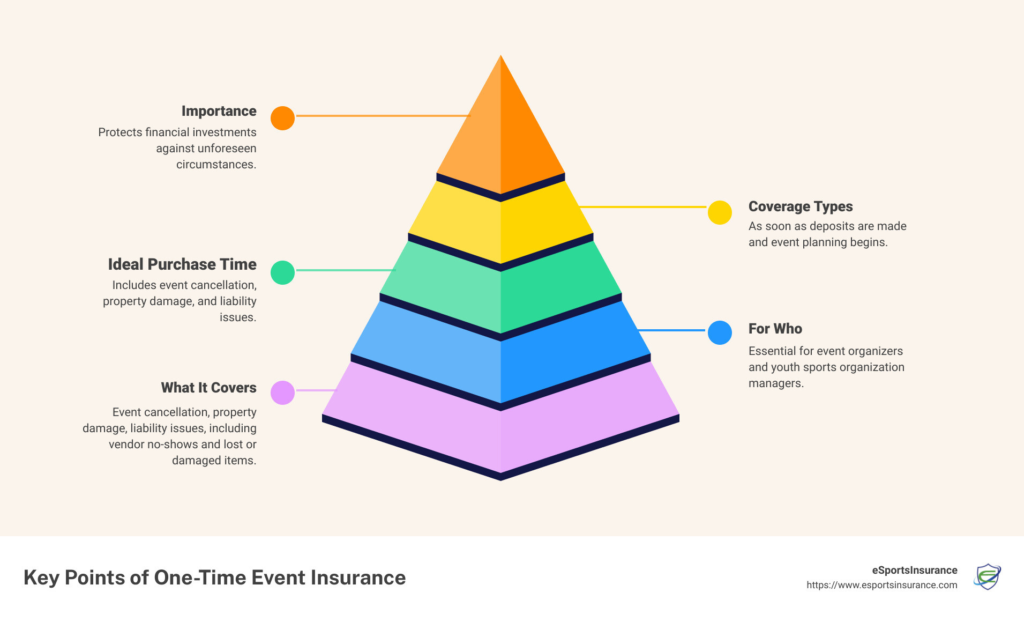Introduction
Sports events encompass a wide range of activities, from local tournaments to international championships, attracting participants, spectators, and organizers alike. Given the dynamic and physical nature of sports, insurance coverage becomes essential to mitigate potential risks and liabilities associated with these events. In the United States, insurance policies tailored specifically for sports events play a crucial role in providing financial protection and peace of mind for all involved parties.

Athlete Coverage:
Insurance for athletes participating in sports events is designed to provide coverage for a variety of potential risks they may face. This coverage typically includes:
- Medical Expense Coverage: Athletes are covered for medical expenses resulting from injuries sustained during training, competitions, or other related activities. This coverage may include hospital bills, surgery costs, rehabilitation expenses, and other necessary medical treatments.
- Disability Benefits: In the event of a severe injury resulting in temporary or permanent disability, athletes may receive disability benefits to compensate for lost income and ongoing medical care.
- Personal Accident Insurance: This insurance provides financial support to athletes and their families in case of accidental death or permanent disability resulting from covered injuries.
Insurance providers work closely with sports organizations and governing bodies to tailor coverage plans that meet the specific needs of athletes while ensuring compliance with relevant regulations and standards.

Organizer Coverage:
Event organizers also require comprehensive insurance coverage to protect against various risks associated with hosting sports events. This coverage may include:
- General Liability Insurance: Event organizers are covered against claims for bodily injury, property damage, and legal expenses arising from event-related incidents. This insurance provides financial protection in case of accidents or injuries suffered by participants, spectators, or third parties during the event.
- Event Cancellation Insurance: In the event of unforeseen circumstances leading to event cancellation or postponement, organizers may be reimbursed for financial losses incurred, including venue rental fees, marketing expenses, and lost revenue opportunities.
- Property Insurance: Coverage for property damage to event venues, equipment, or facilities ensures that organizers are financially protected in case of accidents, vandalism, or natural disasters.

Participant Liability Coverage:
Participant liability coverage is crucial for protecting athletes, volunteers, and event staff from potential liability claims resulting from accidents or injuries during the event. This coverage extends to:
- Accidental Injuries: Athletes and volunteers are covered for accidental injuries caused to third parties, such as spectators or bystanders, during the event.
- Property Damage: Coverage is provided for unintentional damage to third-party property, including venue facilities, equipment, or personal belongings.
Spectator Protection:
Spectator protection is another essential aspect of sports event insurance. Spectators attending sports events may be covered for:
- Medical Expenses: Coverage for medical expenses incurred due to injuries sustained while attending the event, such as slips and falls, crowd incidents, or flying objects.
- Legal Liability: Protection against liability claims brought by spectators for injuries or damages suffered during the event.
Compliance with Regulations:
Insurance for sports events must comply with federal, state, and local regulations governing insurance practices, liability requirements, and event safety standards. Compliance includes adherence to:
- Federal Regulations: Regulations set forth by federal agencies such as the Department of Commerce, Department of Transportation, and the Federal Emergency Management Agency (FEMA) ensure compliance with insurance mandates and safety standards.
- State and Local Regulations: State and local municipalities may have additional regulations pertaining to insurance requirements, liability coverage, and safety protocols for sports events held within their jurisdiction.
Event organizers must work closely with insurance providers to ensure compliance with all applicable regulations and standards to mitigate potential risks and liabilities effectively.

Risk Management Strategies:
Effective risk management is essential for sports event organizers to minimize potential liabilities, ensure participant safety, and maintain the integrity of the event. Key risk management strategies include:
- Safety Protocols: Implementing comprehensive safety protocols and procedures, including emergency action plans, medical support services, and crowd management strategies, to prevent accidents and respond effectively to emergencies.
- Venue Inspection: Conducting thorough inspections of event venues, facilities, and equipment to identify and address potential hazards or safety concerns before the event.
- Training and Education: Providing training and education to event staff, volunteers, and participants on safety guidelines, risk awareness, and emergency response procedures to promote a safe and secure event environment.
- Insurance Coverage Review: Regularly reviewing insurance coverage plans with insurance providers to ensure adequate protection against emerging risks and evolving regulatory requirements.
By implementing proactive risk management strategies and maintaining robust insurance coverage, sports event organizers can minimize potential risks and liabilities while ensuring the safety and well-being of all participants, spectators, and stakeholders involved.
Conclusion:
In conclusion, insurance for sports events is a critical component of risk management and financial protection for athletes, organizers, participants, and spectators. Under USA policy, insurance providers offer comprehensive coverage solutions tailored to the unique risks and liabilities associated with sports events. By working closely with insurance providers, adhering to regulatory requirements, and implementing effective risk management strategies, sports event organizers can create a safe, secure, and enjoyable experience for all involved while mitigating potential financial losses and legal liabilities.



